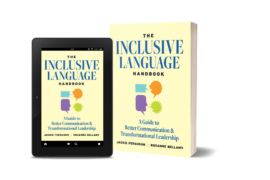What, exactly, is Inclusive Listening?
Language is a two-way street. It takes both a speaker and a listener, to make communication work. Think of it as two wheels on a bike. If one wheel isn’t up to speed, there’s little forward movement.
Inclusive listening is the act of listening, with intentionality, to all the voices of a diverse workforce. It means listening to others in ways that invite participation and collaboration. In a global workforce, where English isn’t everyone’s first language, inclusive listening includes developing the skills to understand the accents of clients and colleagues who speak English as an additional language (aka accent comprehension). Without this ability, a business’s bottom line is compromised. Let’s take a deep dive into what happens when communication is compromised by an inability to understand accents that are different from our own.
The research is clear. Regardless of language, accents make speech more difficult for the listener’s brain to process. This processing difficulty can cause the listener to remember less accurately what the speaker says, make snap judgements, and even doubt the credibility of the speaker. There exists a greater chance of errors and people’s ideas are discounted because of their accents. Companies lose money, time, and opportunities when their employees (or partners) can’t understand one another. Inclusive listening is a business imperative.
Business professionals can learn a methodology to systematically “tune their ear” to unfamiliar accents and acquire a step-by-step approach that minimizes the processing demands required of the brain to comprehend unfamiliar accents. They may hear an accent, but the brain immediately interprets it so the meaning of words are clear. In doing so, fewer miscommunications arise, and business initiatives stay on track.
In addition to learning how to understand global accents, inclusive listening requires mitigating unconscious accent bias. It means removing the blame for difficult communication from the non-native English speaker, and rightly places it on the complexities of the English language.

English pronunciation is hard. It’s not the person, it’s the language. One reason is that English is not a phonetic language. In other words, one letter can have several different pronunciations. In most languages, one letter equals one sound. Not so in English. For example, the letter ‘o’ can be pronounced seven different ways. Try saying the following words aloud: copy, cost, consider, cool, code, could, and coward. One letter, seven pronunciations. Now let’s take a look at the two words “woman” and “women”. The letter ‘o’ is pronounced in two different ways. It’s the two letters, “a” and “e”, that are pronounced the same. Understanding the complexities of English pronunciation creates an appreciation for the challenges people who speak English as an additional language must overcome.
It goes without saying that inclusive listening mandates listening with compassion. There are several techniques for listening, and speaking, in ways that invite people into the conversation rather than push them away. One of these is to eliminate the phrase, “What? What did you say? Can you repeat that?” These questions unintentionally send the message that the person with the nonstandard accent is to blame for the communication disconnect. There’s no cause for blame. This is simply a situation where two people with different accent patterns are trying to communicate with ease. To ask for information without inadvertently casting blame, try replacing the phrases “What?” or “What did you say?” with “I’m sorry. Can you repeat that for me?” This conveys a sense of both parties being in it together.
Inclusive listening skills prevent having to ask people to repeat themselves nearly as often and eliminates the fear in asking when necessary. In a global economy, inclusive listening is a necessary skill set to leverage innovative ideas that come with a diverse talent base. It allows all voices to contribute with impact. Like a bike with both wheels spinning, inclusive listening is a business imperative that allows companies to upskill their talent base and cross the finish line.
Learn more in our inclusive listening workshop, brought to you in partnership with Judy Ravin.

Judy Ravin is the President and co-founder of Accents International. She is an inclusive listening expert enabling teams to overcome language barriers while maintaining each person’s unique cultural identity. Ravin is best known for her two learning and development programs: Powerful Pronunciation® and Inclusive Listening: Tuning Your Ear to Accents®; collectively known as the Ravin Method®.





